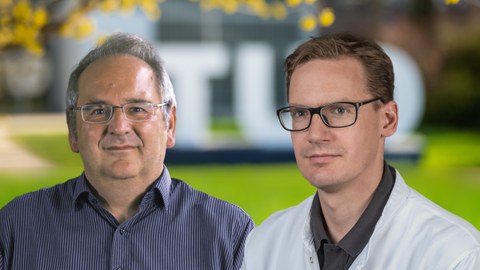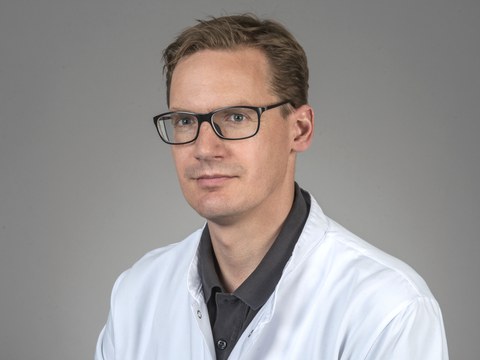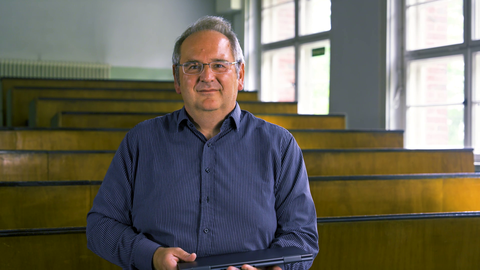Nov 07, 2024
Millions in funding from the EU: Two renowned ERC Synergy Grants go to TUD researchers
For the first time, two researchers from TUD Dresden University of Technology have received one of the prestigious Synergy Grants from the European Research Council (ERC). It's a rare occurrence that two researchers from the same institution are awarded the grant at the same time. Prof. Daniel Stange from the Faculty of Medicine and a team of scientists from the UK and South Korea will receive funding of almost EUR 10 million. In their “ClonEScape” project, they are seeking to understand how tumors develop. Prof. Thomas Heine from TU Dresden, Xinliang Feng from the Max Planck Institute for Microstructure Physics in Halle (Germany) and Grégory Schneider from Leiden University (Netherlands) are working on the development of ultra-thin membranes and will also receive a Synergy Grant of EUR 10 million for their research. From 548 applications from across Europe, the European Research Council selected 57 projects to receive the Synergy Grants.
“We push the boundaries of our knowledge by very closely collaborating across different disciplines and by cooperating as a matter of course with the brightest minds from around the world to solve a given problem. The success of our two researchers and their teams perfectly embodies this fundamental credo of our university. I congratulate all those involved on this outstanding award,” said Prof. Ursula Staudinger, Rector of TUD, on behalf of the Extended University Executive Board. She also commented: “The two research projects have great potential and are evidence of the high capabilities of the Dresden research hub.”
ClonEScape: Tracking the development of tumors
How do tumors develop and why can they spread? What strategies do the mutated cells use to circumvent the body's protective mechanisms, multiply and ultimately lead to cancer? A research alliance of renowned institutions from Dresden (Germany), Cambridge (UK) and Daejeon (South Korea) is working to shed some light on how tumors develop with the joint project “ClonEScape”. The aim is to use the findings to provide innovative approaches for the prevention, detection and treatment of cancer at an early stage.
For this project, the researchers Prof. Daniel Stange (TU Dresden), Prof. Benjamin Simons (University of Cambridge), Dr. Maria Alcolea (University of Cambridge) and Dr. Bon-Kyoung Koo (Institute for Basic Science) have been awarded the prestigious ERC Synergy Grant. The research team at TU Dresden will receive around EUR 1.5 million of the total funding.
"Over the next six years, the research group will strive for a better understanding of the cellular and molecular mechanisms that lead to initial tumor development, and to develop potential preventative and therapeutic approaches," explains Prof. Daniel Stange, physician and scientist at the University Hospital Dresden, TUD’s Faculty of Medicine and the National Center for Tumor Diseases (NCT/UCC) in Dresden.
More information on the ClonEScape project
2DPolyMembrane: Ultra-thin membranes for higher energy efficiency in separation processes
Separation processes are essential in our daily lives, from drug development and purification, wastewater treatment to the separation of mass transfer in fuel cells. However, these large-scale industrial processes consume a lot of energy due to the thickness of the membranes and the random movement of the particles.
With the 2DPolyMembrane project, the research consortium led by Thomas Heine, Chair of Theoretical Chemistry at TU Dresden, Xinliang Feng from the Max Planck Institute of Microstructure Physics in Halle and Grégory Schneider from the University of Leiden aims to develop ultra-thin, nanoporous membranes that enable new membrane concepts and unprecedented performance for energy devices such as fuel cells, osmotic power generators, and batteries.
“We have succeeded in developing ultra-thin membranes, i.e. only 10-50 nanometers thick, which are significantly superior to conventional technology in terms of selectivity and efficiency. In addition to increased energy efficiency, they also allow the separation of similar particles, such as hydrogen isotopes,” Thomas Heine explains. “To do so, we use our newly developed 2D polymer heterostructures, which contain atomically precise funnel-shaped pores with electrostatic gradients.” The team in Dresden will receive EUR 3 million from the total funding amount.
More information on the project 2DPolyMembrane
Previous ERC Synergy Grants with TUD participation:
About the ERC and the ERC Synergy Grants:
The European Research Council was established by the European Commission and is an institution for funding excellent fundamental research. The ERC Synergy Grants support teams of two to four individual researchers working at different locations. They provide funding for projects that lead to “progress at the frontiers of knowledge” via interdisciplinary collaboration. The grant is endowed with up to EUR 10 million over a period of six years. For the current call, the ERC received 548 applications. 57 projects were selected for funding. The European Research Council is providing EUR 571 million for these projects.
Contact:
Anne-Stephanie Vetter
Staff Unit Public Relations of the Carl Gustav Carus Faculty of Medicine of TUD Dresden University of Technology
National Center for Tumor Diseases (NCT/UCC) Dresden
Tel.: +49 351 458 17903
Email:
Nicole Gierig
Public Relations Advisor
School of Science
Tel.: +49 351 463 39504
Email:



